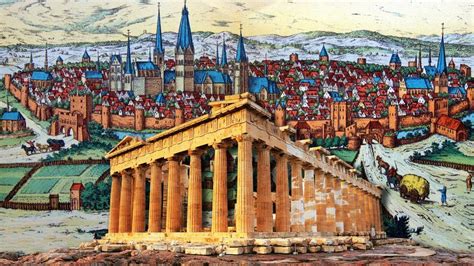Definition
In the context of AP World History, a city-state is a small, independent political entity organized around a central urban area. It typically possesses a well-defined territory, a centralized government, and a shared identity among its inhabitants. City-states emerged in various regions of the world during the Neolithic Revolution and played a pivotal role in the development of civilization.

Key Characteristics
- Compact Territory: City-states had relatively small territories, often limited to the urban center and its immediate surroundings.
- Urban Core: The city-state’s central hub was its urban area, which served as the economic, political, and cultural center.
- Sovereign Government: City-states were independent entities with their own laws, governing bodies, and military forces.
- Shared Identity: The inhabitants of a city-state shared a common identity based on language, culture, history, and religion.
Advantages of City-States
- Economic Prosperity: Urban centers fostered specialization and trade, leading to economic growth and wealth accumulation.
- Political Stability: The centralized government provided law and order, maintaining stability within the city-state.
- Cultural Innovation: The concentration of people and resources in urban areas stimulated intellectual and artistic development.
- Military Power: City-states could raise armies from their urban populations and utilize advanced technologies, making them formidable opponents.
Limitations of City-States
- Territorial Constraints: Small territories limited expansion and resource availability, leading to competition and conflict with neighboring city-states.
- Political Instability: City-states were susceptible to internal power struggles and external threats, sometimes resulting in political instability and collapse.
- Environmental Stress: The concentration of population and economic activity in urban areas could strain environmental resources, such as water and land.
Historical Significance
City-states played a crucial role in the development of ancient civilizations, including:
- Mesopotamia: Sumerian city-states, such as Ur and Uruk, developed writing, mathematics, and astronomy.
- Indus Valley: The Harappan civilization consisted of numerous city-states, known for their advanced urban planning and commerce.
- Greece: Greek city-states, such as Athens and Sparta, fostered democracy, philosophy, and the arts.
- Italy: The Roman city-state emerged from a group of Latin towns and gradually conquered and incorporated much of the Mediterranean basin.
Comparison to Other Political Structures
Compared to larger states and empires, city-states had advantages and disadvantages:
| Feature | City-State | State | Empire |
|---|---|---|---|
| Size | Small | Medium to large | Large |
| Territory | Compact | Expanding | Extensive |
| Government | Centralized | Decentralized | Bureaucratic |
| Identity | Strong | Diverse | Imperial |
| Stability | Fragile | Moderate | Complex |
Contemporary Relevance
Understanding city-states remains relevant today in various contexts:
- Global City-States: Singapore and Monaco are contemporary examples of city-states that maintain sovereignty and economic success.
- City-State Movements: Some modern cities, such as Barcelona and Venice, have pursued autonomy and self-governance, drawing inspiration from historical city-state models.
- Urban Governance: The challenges and opportunities of managing urban areas, such as transportation, housing, and pollution, echo the experiences of ancient city-states.
Conclusion
City-states were significant political entities in the development of human civilization. Their compact territories, urban cores, sovereign governments, and shared identities enabled them to thrive economically, politically, and culturally. While they faced limitations due to territorial constraints and potential instability, city-states laid the foundation for more complex and extensive political structures that emerged over time. Their legacy continues to inform contemporary urban governance and inspire movements for self-determination.
FAQs
1. What was the primary advantage of city-states? City-states fostered economic prosperity, political stability, cultural innovation, and military power due to the concentration of people and resources in urban areas.
2. What were the limitations of city-states? Small territories, internal power struggles, and environmental stress were the primary limitations of city-states.
3. Can city-states exist in modern times? Yes, contemporary examples of city-states include Singapore and Monaco, which maintain sovereignty and economic success.
4. What are the lessons from historical city-states for urban governance today? The challenges and opportunities of managing modern cities, such as transportation, housing, and pollution, mirror the experiences of ancient city-states.
5. Are city-states inherently democratic? Not necessarily, as city-states can have varying forms of government, including monarchies, oligarchies, or democracies.
6. Why did city-states emerge? City-states emerged due to the advantages of specialization and trade in urban centers, as well as the need for protection and cooperation in small, geographically defined areas.
7. How did city-states contribute to the development of civilization? City-states played a crucial role in developing writing, mathematics, astronomy, urban planning, and other key advancements that laid the foundation for more complex societies.
8. What factors led to the decline of city-states? Territorial constraints, external threats, and internal instability were some of the factors that contributed to the decline of city-states, especially in the face of larger and more powerful empires.
